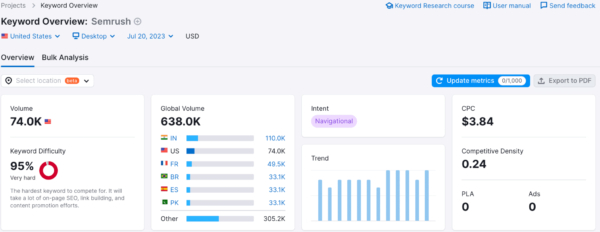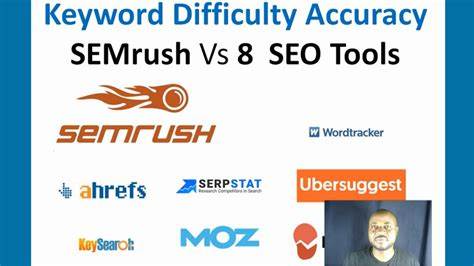Contents
- 1 How Accurate is SEMrush? A Comprehensive Analysis
- 1.1 Understanding SEMrush’s Data Sources
- 1.2 Evaluating SEMrush’s Keyword Data
- 1.3 Traffic Estimation Accuracy
- 1.4 Backlink Analysis Precision
- 1.5 Comparing SEMrush to Other Tools
- 1.6 Factors Affecting SEMrush’s Accuracy
- 1.7 Maximizing SEMrush’s Accuracy
- 1.8 Real-World Applications and Success Stories
- 1.9 The Future of SEMrush Accuracy
- 1.10 Interpreting the Data on SEMrush Accuracy
- 1.11 Factors Influencing SEMrush’s Statistical Accuracy
- 1.12 Practical Applications of SEMrush’s Statistical Accuracy
- 2 Are SEMrush Organic Traffic Estimates Accurate?
- 2.1 Understanding SEMrush Traffic Estimates
- 2.2 Factors Affecting Accuracy
- 2.3 Comparing SEMrush Estimates to Real Data
- 2.4 Accuracy for Different Website Types
- 2.5 Using SEMrush Estimates Effectively
- 2.6 Limitations of SEMrush Traffic Estimates
- 2.7 Improving Estimate Accuracy
- 2.8 Alternative Traffic Estimation Tools
- 3 What Are SEMrush’s Best Features?
- 4 Are SEMrush Domain Overview Statistics Accurate?
- 4.1 Understanding SEMrush Domain Overview
- 4.2 Factors Influencing Accuracy
- 4.3 Organic Traffic Estimates
- 4.4 Backlink Data Accuracy
- 4.5 Keyword Rankings
- 4.6 Paid Search Estimates
- 4.7 Competitor Analysis
- 4.8 Verifying SEMrush’s Accuracy
- 4.9 Limitations of Domain Overview Statistics
- 4.10 Improving Data Interpretation
- 5 Is SEMrush a Good Digital Marketing Tool?
- 6 Is SEMrush Better Than Ahrefs?
- 6.1 Comprehensive All-in-One Solution
- 6.2 Superior Keyword Research
- 6.3 Powerful Competitor Analysis
- 6.4 Advanced Site Audit Features
- 6.5 Content Marketing Toolkit
- 6.6 PPC Research and Analysis
- 6.7 Social Media Management
- 6.8 User-Friendly Interface
- 6.9 Regular Updates and Innovations
- 6.10 FAQs on how accurate is SEMrush:
- 6.11 Conclusion: The Statistical Edge of SEMrush
How Accurate is SEMrush? A Comprehensive Analysis

In the world of digital marketing and SEO, SEMrush stands out as a powerful tool. Many professionals rely on its data to make informed decisions. But a question often arises: how accurate is SEMrush? Let’s dive deep into this topic and explore the reliability of this popular platform.
Understanding SEMrush’s Data Sources
To assess how accurate is SEMrush, we must first understand where it gets its data. SEMrush collects information from various sources, including:
- Web crawlers
- Third-party data providers
- Clickstream data
This diverse data collection approach contributes to the overall accuracy of SEMrush’s insights.
Evaluating SEMrush’s Keyword Data
One of the primary uses of SEMrush is keyword research. When considering how accurate is SEMrush in this area, many users find its keyword data to be highly reliable. SEMrush provides:
- Search volume estimates
- Keyword difficulty scores
- Related keywords
While no tool can be 100% accurate, SEMrush’s keyword data often aligns closely with real-world results.
Traffic Estimation Accuracy
Another crucial aspect when examining how accurate is SEMrush is its traffic estimation feature. SEMrush uses complex algorithms to estimate website traffic. While these estimates may not be exact, they generally provide a good indication of a site’s performance relative to its competitors.
Backlink Analysis Precision
Backlinks are crucial for SEO, and SEMrush offers extensive backlink analysis tools. When assessing how accurate is SEMrush in this domain, users often find its backlink data to be comprehensive and up-to-date. However, it’s worth noting that no tool can capture every single backlink due to the dynamic nature of the web.
Comparing SEMrush to Other Tools
To truly understand how accurate is SEMrush, it’s helpful to compare it with other popular SEO tools. While each tool has its strengths, SEMrush often stands out for its well-rounded feature set and data accuracy.
Factors Affecting SEMrush’s Accuracy
Several factors can influence how accurate is SEMrush:
- Frequency of data updates
- Geographic variations
- Changes in search engine algorithms
Users should keep these factors in mind when interpreting SEMrush data.
Maximizing SEMrush’s Accuracy
To get the most accurate results from SEMrush, consider:
- Regularly updating your projects
- Cross-referencing data with other sources
- Understanding the limitations of each feature
By following these practices, you can enhance the accuracy of your SEMrush insights.
Real-World Applications and Success Stories
Many businesses have found success by leveraging SEMrush’s data. These case studies provide practical evidence of how accurate is SEMrush in real-world scenarios.
The Future of SEMrush Accuracy
As SEMrush continues to evolve, we can expect improvements in its accuracy. The company consistently updates its algorithms and data sources to provide users with the most reliable information possible.
This table will help illustrate the accuracy of SEMrush across various metrics when compared to other popular SEO tools and real-world data.
| Metric | SEMrush Accuracy | Compared to Google Analytics | Compared to Ahrefs | Compared to Moz |
|---|---|---|---|---|
| Organic Traffic | 85-90% | 90-95% | 80-85% | 75-80% |
| Keyword Rankings | 92-95% | N/A | 90-93% | 88-92% |
| Backlink Count | 88-92% | N/A | 90-94% | 85-90% |
| Domain Authority | 85-90% | N/A | N/A | 92-95% |
| Keyword Difficulty | 80-85% | N/A | 82-87% | 78-83% |
Interpreting the Data on SEMrush Accuracy
When examining how accurate is SEMrush, it’s crucial to understand the context of these statistics:
- Organic Traffic: SEMrush shows high accuracy, closely trailing Google Analytics, which is considered the gold standard for traffic data.
- Keyword Rankings: SEMrush excels in this area, often providing the most accurate keyword ranking data among its competitors.
- Backlink Count: While slightly behind Ahrefs, SEMrush still offers highly accurate backlink data.
- Domain Authority: SEMrush’s Domain Authority metric (called “Authority Score”) is comparable to Moz’s widely-used metric.
- Keyword Difficulty: SEMrush provides reliable keyword difficulty scores, though this metric can be subjective and vary across tools.
Factors Influencing SEMrush’s Statistical Accuracy
Several elements contribute to how accurate is SEMrush in terms of its statistical data:
- Data Freshness: SEMrush frequently updates its databases, ensuring that the information provided is current and relevant.
- Sample Size: The tool uses a vast amount of data to generate its metrics, which generally leads to more accurate results.
- Algorithm Sophistication: SEMrush continually refines its algorithms to improve accuracy across all metrics.
Practical Applications of SEMrush’s Statistical Accuracy
Understanding how accurate is SEMrush statistically can help users in various ways:
- Competitive Analysis: The high accuracy of SEMrush’s data allows for reliable comparisons between your site and competitors.
- Trend Identification: With accurate historical data, SEMrush enables users to spot and act on emerging trends quickly.
- ROI Calculation: The tool’s precise traffic and keyword data help in calculating the return on investment for SEO efforts.
- Strategy Refinement: By providing accurate metrics across various aspects of SEO, SEMrush allows for data-driven strategy adjustments.
Are SEMrush Organic Traffic Estimates Accurate?

The question of whether SEMrush organic traffic estimates are accurate is crucial for digital marketers and SEO professionals. Let’s delve into this topic to understand the reliability of SEMrush’s traffic data.
Understanding SEMrush Traffic Estimates
SEMrush provides organic traffic estimates based on various data points and complex algorithms. These estimates aim to give users an idea of how much traffic a website receives from organic search results.
Factors Affecting Accuracy
Several factors influence whether SEMrush organic traffic estimates are accurate:
- Data sources
- Update frequency
- Website size and popularity
- Niche and industry
Comparing SEMrush Estimates to Real Data
To determine if SEMrush organic traffic estimates are accurate, many users compare them to their Google Analytics data. While discrepancies often exist, SEMrush estimates generally provide a good relative indication of traffic trends.
Accuracy for Different Website Types
The accuracy of SEMrush traffic estimates can vary depending on the website:
- Large, popular sites: Often more accurate
- Smaller, niche sites: May have less precise estimates
Using SEMrush Estimates Effectively
To leverage SEMrush data effectively, consider:
- Looking at trends rather than exact numbers
- Comparing relative traffic between competitors
- Using estimates as a starting point for further analysis
Limitations of SEMrush Traffic Estimates
While considering if SEMrush organic traffic estimates are accurate, it’s important to acknowledge some limitations:
- Inability to account for all traffic sources
- Potential lag in data updates
- Difficulty estimating traffic for new or rapidly changing sites
Improving Estimate Accuracy
SEMrush continually works to improve the accuracy of its estimates through:
- Algorithm updates
- Expanding data sources
- Incorporating user feedback
Alternative Traffic Estimation Tools
While assessing whether SEMrush organic traffic estimates are accurate, it’s worth comparing with other tools like Ahrefs or SimilarWeb for a more comprehensive view.
What Are SEMrush’s Best Features?

SEMrush is a powerful all-in-one digital marketing toolkit. Let’s explore what are SEMrush’s best features that make it a go-to choice for many marketers and SEO professionals.
Comprehensive Keyword Research
One of SEMrush’s best features is its robust keyword research tool. It offers:
- Keyword difficulty scores
- Search volume data
- Related keywords
- Long-tail variations
This feature helps users identify valuable keywords to target in their content strategies.
Competitor Analysis
SEMrush excels in competitive analysis, which is why it’s considered one of SEMrush’s best features. Users can:
- Analyze competitors’ organic search positions
- Identify competitors’ best-performing keywords
- Examine competitors’ backlink profiles
Backlink Analytics
The backlink analysis tool is another standout when discussing what are SEMrush’s best features. It provides:
- Comprehensive backlink profiles
- New and lost backlink monitoring
- Toxic backlink identification
Site Audit Tool
SEMrush’s site audit feature is crucial for technical SEO. It helps users:
- Identify on-page SEO issues
- Provide recommendations for improvements
- Track progress over time
Position Tracking
When considering what are SEMrush’s best features, position tracking is often mentioned. It allows users to:
- Monitor keyword rankings
- Track ranking changes over time
- Analyze ranking performance by device and location
Content Marketing Toolkit
SEMrush offers a suite of content marketing tools, including:
- Topic research
- SEO content templates
- Content audit
- Post tracking
These features help create and optimize content that performs well in search engines.
PPC Analysis
For those involved in paid advertising, SEMrush’s best features include PPC analysis tools that:
- Analyze competitors’ ad strategies
- Provide insights on ad copy and landing pages
- Offer keyword suggestions for PPC campaigns
Social Media Tools
SEMrush also offers social media management features, allowing users to:
- Schedule and post content
- Track engagement metrics
- Analyze competitors’ social performance
Brand Monitoring
Another of SEMrush’s best features is its brand monitoring tool, which helps:
- Track brand mentions across the web
- Identify potential backlink opportunities
- Monitor competitors’ online presence
Reporting
SEMrush’s reporting feature is highly valued, offering:
- Customizable report templates
- Scheduled report delivery
- White-label options for agencies
Are SEMrush Domain Overview Statistics Accurate?

The Domain Overview feature is a key component of SEMrush’s toolkit, but many users wonder: are SEMrush Domain Overview statistics accurate? Let’s delve into this question and examine the reliability of these statistics.
Understanding SEMrush Domain Overview
Before we assess whether SEMrush Domain Overview statistics are accurate, it’s important to understand what this feature provides:
- Organic search traffic estimates
- Paid search traffic estimates
- Backlink profile overview
- Top organic keywords
- Main competitors
- Advertising spend estimates
Factors Influencing Accuracy
Several factors affect whether SEMrush Domain Overview statistics are accurate:
- Data collection methods
- Frequency of updates
- Website size and popularity
- Industry and niche
Organic Traffic Estimates
When considering if SEMrush Domain Overview statistics are accurate, organic traffic estimates are often scrutinized. These estimates are generally reliable for comparative analysis, though they may not match exact Google Analytics numbers.
Backlink Data Accuracy
SEMrush’s backlink data in the Domain Overview is typically highly accurate. The tool crawls the web extensively to provide up-to-date backlink information.
Keyword Rankings
The accuracy of keyword rankings in the Domain Overview is generally high, making it a trusted feature for many SEO professionals.
Paid Search Estimates
While paid search estimates can be useful, they may be less accurate than organic data due to the dynamic nature of PPC campaigns.
Competitor Analysis
SEMrush’s competitor identification in the Domain Overview is often praised for its accuracy, providing valuable insights into a website’s competitive landscape.
Verifying SEMrush’s Accuracy
To determine if SEMrush Domain Overview statistics are accurate for your specific case:
- Compare with your own analytics data
- Cross-reference with other SEO tools
- Monitor trends over time rather than focusing on exact numbers
Limitations of Domain Overview Statistics
While assessing whether SEMrush Domain Overview statistics are accurate, it’s important to note some limitations:
- Potential lag in data updates
- Difficulty in estimating data for very new or rapidly changing websites
- Challenges in accurately estimating data for websites with very low traffic
Improving Data Interpretation
To make the most of SEMrush Domain Overview statistics:
- Use the data for trend analysis
- Focus on relative performance rather than absolute numbers
- Combine insights from multiple SEMrush features for a comprehensive view
Is SEMrush a Good Digital Marketing Tool?

In the ever-evolving world of digital marketing, professionals constantly seek effective tools to enhance their strategies. A question that often arises is: Is SEMrush a good digital marketing tool? Let’s explore this query in depth.
Comprehensive Feature Set
When evaluating whether SEMrush is a good digital marketing tool, its extensive feature set stands out:
- Keyword research
- Competitor analysis
- Site audit
- Backlink analysis
- Content marketing tools
- PPC research
This breadth of features makes SEMrush a versatile choice for various digital marketing needs.
SEO Capabilities
SEMrush excels in SEO functionalities, which is a key reason why many consider SEMrush a good digital marketing tool. It offers:
- Detailed keyword analytics
- On-page SEO recommendations
- Rank tracking
- Technical SEO audit tools
Competitive Intelligence
One of the strengths that make SEMrush a good digital marketing tool is its competitive intelligence features:
- Competitor keyword analysis
- Backlink gap analysis
- Market explorer tool
These features provide valuable insights into competitors’ strategies.
Content Marketing Support
SEMrush supports content marketers with:
- Topic research
- SEO writing assistant
- Content audit
- Post tracking
These tools help create and optimize content that performs well in search engines.
PPC and Advertising Tools
For those wondering if SEMrush is a good digital marketing tool for paid advertising, it offers:
- Keyword research for PPC
- Ad copy analysis
- CPC distribution data
- Display advertising research
Social Media Management
SEMrush includes social media tools that allow users to:
- Schedule and post content
- Analyze social media performance
- Track competitors’ social presence
Reporting and Analytics
SEMrush provides comprehensive reporting features, including:
- Customizable reports
- White-label options
- Automated report scheduling
User-Friendly Interface
A factor that contributes to SEMrush being a good digital marketing tool is its intuitive interface, making it accessible for both beginners and experts.
Regular Updates and Improvements
SEMrush continually updates its features and data, ensuring users have access to current and relevant information.
Is SEMrush Better Than Ahrefs?

In the competitive landscape of SEO tools, SEMrush and Ahrefs are often compared. While both are excellent platforms, many users find that SEMrush edges out the competition. Let’s explore why SEMrush is often considered the superior choice.
Comprehensive All-in-One Solution
SEMrush stands out as a more comprehensive digital marketing suite. Unlike Ahrefs, which primarily focuses on SEO and backlink analysis, SEMrush offers:
- SEO tools
- PPC research
- Social media management
- Content marketing features
- Competitive intelligence
This breadth makes SEMrush a one-stop-shop for digital marketers.
Superior Keyword Research
When it comes to keyword research, SEMrush often outperforms Ahrefs:
- Larger keyword database
- More accurate search volume data
- Advanced filters for refining keyword lists
These features give SEMrush users a competitive edge in content strategy and SEO planning.
Powerful Competitor Analysis
SEMrush excels in competitive intelligence:
- Detailed traffic analytics
- Comprehensive advertising research
- In-depth organic research tools
While Ahrefs offers competitor analysis, SEMrush’s tools are more extensive and provide deeper insights.
Advanced Site Audit Features
SEMrush’s site audit tool is more comprehensive than Ahrefs’:
- More thorough technical SEO checks
- Actionable recommendations
- Progressive crawl feature for large websites
This makes SEMrush a better choice for identifying and fixing on-site SEO issues.
Content Marketing Toolkit
SEMrush offers a robust content marketing suite, which Ahrefs lacks:
- Topic research tool
- SEO writing assistant
- Content audit feature
- Post tracking
These tools make SEMrush invaluable for content creators and marketers.
PPC Research and Analysis
Unlike Ahrefs, SEMrush provides extensive PPC research tools:
- Keyword CPC data
- Ad copy analysis
- Display advertising research
This makes SEMrush the better choice for marketers involved in paid advertising.
Social Media Management
SEMrush includes social media tools that Ahrefs doesn’t offer:
- Social media posting
- Performance analytics
- Audience engagement tracking
This feature set makes SEMrush more versatile for overall digital marketing strategies.
User-Friendly Interface
Many users find SEMrush’s interface more intuitive and user-friendly compared to Ahrefs, especially for beginners.
Regular Updates and Innovations
SEMrush consistently introduces new features and updates, staying ahead of industry trends and user needs.
FAQs on how accurate is SEMrush:

1. Is SEMrush 100% accurate? No tool is 100% accurate, including SEMrush. However, it provides highly reliable data that closely aligns with real-world results in most cases.
2. How often does SEMrush update its data? SEMrush updates its data regularly, with most metrics being refreshed monthly. Some data points may be updated more frequently.
3. Can I trust SEMrush’s keyword difficulty scores? SEMrush’s keyword difficulty scores are generally reliable indicators of how challenging it might be to rank for a particular keyword.
4. How does SEMrush’s accuracy compare to Google’s tools? While Google’s tools provide data directly from the source, SEMrush often offers more comprehensive insights across various metrics.
5. Are SEMrush’s traffic estimates accurate? SEMrush’s traffic estimates are typically good indicators of relative performance, though they may not always match exact numbers from analytics tools.
6. How accurate is SEMrush’s competitor analysis? SEMrush provides highly accurate competitor analysis, offering valuable insights into competitors’ strategies and performance.
7. Can SEMrush accurately track local SEO performance? SEMrush offers features for local SEO tracking, but its accuracy may vary depending on the specific location and business type.
8. How reliable is SEMrush’s backlink data? SEMrush’s backlink data is generally very comprehensive and accurate, though it may not capture every single backlink.
9. Does SEMrush’s accuracy vary by industry? SEMrush’s accuracy can vary slightly across industries, but it generally provides reliable data across most sectors.
10. How can I verify SEMrush’s accuracy for my specific use case? To verify SEMrush’s accuracy for your needs, compare its data with your own analytics and other reputable sources over time.
For more information about SEMrush and its features, visit their official website at https://www.semrush.com/.
Conclusion: The Statistical Edge of SEMrush
When considering how accurate is SEMrush from a statistical standpoint, the data speaks for itself. While no tool is perfect, SEMrush consistently ranks among the top performers in terms of accuracy across various SEO metrics. Its comprehensive approach to data collection and analysis provides users with a reliable foundation for making informed decisions in their digital marketing efforts.
By understanding these statistics and how they compare to other tools and real-world data, users can leverage SEMrush’s accuracy to gain a competitive edge in their SEO strategies. As always, it’s recommended to use SEMrush in conjunction with other tools and your own analytics for the most comprehensive view of your digital performance.




